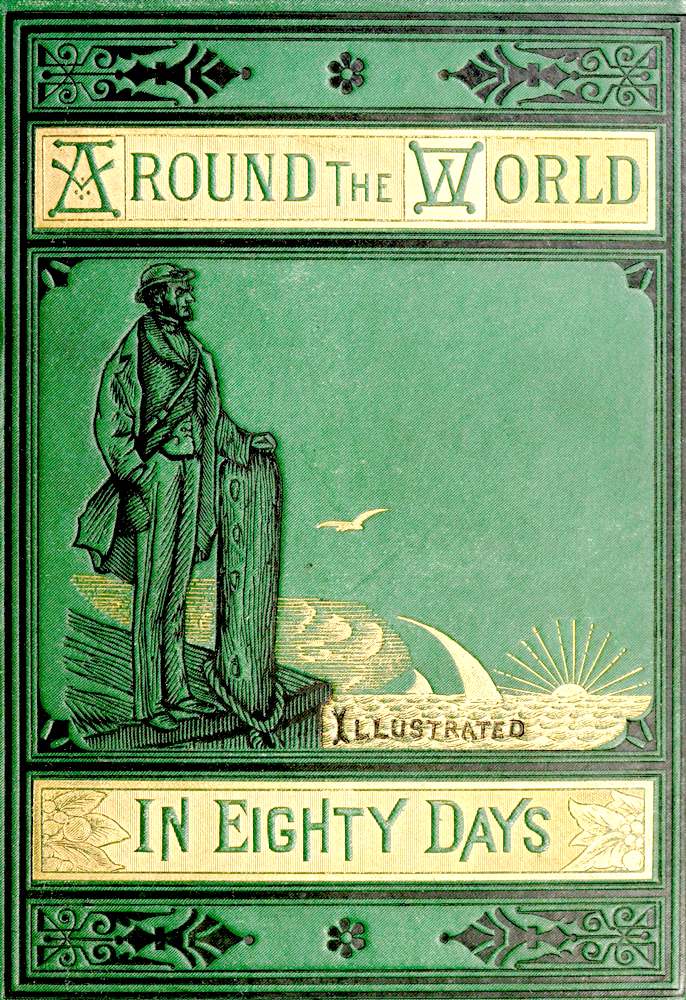|
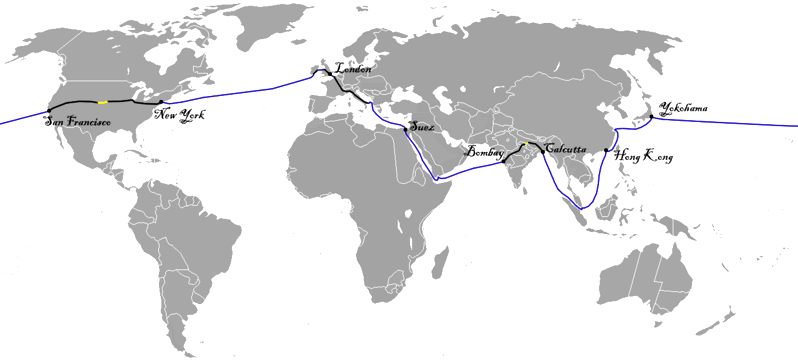
Map
of the route taken by Phileas Fogg, starting in London, then proceeding
east to Suez, Bombay, Calcutta, Hong Kong , Yokohama, San Francisco, New
York, and across the Atlantic
ocean to Ireland, then Liverpool England, and back to London. The route
planner below is for a circumnavigation on water in under 80 days, using
hydrogen, as per the author's prediction in The Mysterious Island. It
would be a major achievement if this was arranged to honor the 150th
anniversary of his publication.
<<<<
CHAPTER XXXII.
IN WHICH PHILEAS FOGG ENGAGES IN A DIRECT STRUGGLE WITH BAD FORTUNE
The “China,” in leaving, seemed to have carried off Phileas Fogg’s last hope. None of the other steamers were able to serve his projects. The “Pereire,” of the French Transatlantic Company, whose admirable steamers are equal to any in speed and comfort, did not leave until the 14th; the Hamburg boats did not go directly to Liverpool or London, but to Havre; and the additional trip from Havre to Southampton would render Phileas Fogg’s last efforts of no avail. The Inman steamer did not depart till the next day, and could not cross the Atlantic in time to save the wager.
Mr. Fogg learned all this in consulting his “Bradshaw,” which gave him the daily movements of the transatlantic steamers.
Passepartout was crushed; it overwhelmed him to lose the boat by three-quarters of an hour. It was his fault, for, instead of helping his master, he had not ceased putting obstacles in his path! And when he recalled all the incidents of the tour, when he counted up the sums expended in pure loss and on his own account, when he thought that the immense stake, added to the heavy charges of this useless journey, would completely ruin Mr. Fogg, he overwhelmed himself with bitter self-accusations. Mr. Fogg, however, did not reproach him; and, on leaving the Cunard pier, only said: “We will consult about what is best to-morrow. Come.”
The party crossed the Hudson in the Jersey City ferryboat, and drove in a carriage to the St. Nicholas Hotel, on Broadway. Rooms were engaged, and the night passed, briefly to Phileas Fogg, who slept profoundly, but very long to Aouda and the others, whose agitation did not permit them to rest.
The next day was the 12th of December. From seven in the morning of the 12th to a quarter before nine in the evening of the 21st there were nine days, thirteen hours, and forty-five minutes. If Phileas Fogg had left in the “China,” one of the fastest steamers on the Atlantic, he would have reached Liverpool, and then London, within the period agreed upon.
Mr. Fogg left the hotel alone, after giving Passepartout instructions to await his return, and inform Aouda to be ready at an instant’s notice. He proceeded to the banks of the Hudson, and looked about among the vessels moored or anchored in the river, for any that were about to depart. Several had departure signals, and were preparing to put to sea at morning tide; for in this immense and admirable port there is not one day in a hundred that vessels do not set out for every quarter of the globe. But they were mostly sailing vessels, of which, of course, Phileas Fogg could make no use.
He seemed about to give up all hope, when he espied, anchored at the Battery, a cable’s length off at most, a trading vessel, with a screw, well-shaped, whose funnel, puffing a cloud of smoke, indicated that she was getting ready for departure.
Phileas Fogg hailed a boat, got into it, and soon found himself on board the “Henrietta,” iron-hulled, wood-built above. He ascended to the deck, and asked for the captain, who forthwith presented himself. He was a man of fifty, a sort of sea-wolf, with big eyes, a complexion of oxidised copper, red hair and thick neck, and a growling voice.
“The captain?” asked Mr. Fogg.
“I am the captain.”
“I am Phileas Fogg, of London.”
“And I am Andrew Speedy, of Cardiff.”
“You are going to put to sea?”
“In an hour.”
“You are bound for—”
“Bordeaux.”
“And your cargo?”
“No freight. Going in ballast.”
“Have you any passengers?”
“No passengers. Never have passengers. Too much in the way.”
“Is your vessel a swift one?”
“Between eleven and twelve knots. The “Henrietta,” well known.”
“Will you carry me and three other persons to Liverpool?”
“To Liverpool? Why not to China?”
“I said Liverpool.”
“No!”
“No?”
“No. I am setting out for Bordeaux, and shall go to Bordeaux.”
“Money is no object?”
“None.”
The captain spoke in a tone which did not admit of a reply.
“But the owners of the ‘Henrietta’—” resumed Phileas Fogg.
“The owners are myself,” replied the captain. “The vessel belongs to me.”
“I will freight it for you.”
“No.”
“I will buy it of you.”
“No.”
Phileas Fogg did not betray the least disappointment; but the situation was a grave one. It was not at New York as at Hong Kong, nor with the captain of the “Henrietta” as with the captain of the “Tankadere.” Up to this time money had smoothed away every obstacle. Now money failed.
Still, some means must be found to cross the Atlantic on a boat, unless by balloon—which would have been venturesome, besides not being capable of being put in practice. It seemed that Phileas Fogg had an idea, for he said to the captain, “Well, will you carry me to Bordeaux?”
“No, not if you paid me two hundred dollars.”
“I offer you two thousand.”
“Apiece?”
“Apiece.”
“And there are four of you?”
“Four.”
Captain Speedy began to scratch his head. There were eight thousand dollars to gain, without changing his route; for which it was well worth conquering the repugnance he had for all kinds of passengers. Besides, passengers at two thousand dollars are no longer passengers, but valuable merchandise. “I start at nine o’clock,” said Captain Speedy, simply. “Are you and your party ready?”
“We will be on board at nine o’clock,” replied, no less simply, Mr. Fogg.
It was half-past eight. To disembark from the “Henrietta,” jump into a hack, hurry to the St. Nicholas, and return with Aouda, Passepartout, and even the inseparable Fix was the work of a brief time, and was performed by Mr. Fogg with the coolness which never abandoned him. They were on board when the “Henrietta” made ready to weigh anchor.
When Passepartout heard what this last voyage was going to cost, he uttered a prolonged “Oh!” which extended throughout his vocal gamut.
As for Fix, he said to himself that the Bank of England would certainly not come out of this affair well indemnified. When they reached England, even if Mr. Fogg did not throw some handfuls of bank-bills into the sea, more than seven thousand pounds would have been spent!
NEXT
>>>>
CHAPTERS
1. - I. IN WHICH PHILEAS FOGG AND PASSEPARTOUT ACCEPT EACH OTHER, THE ONE AS
MASTER AND AS MAN
2. - II. IN WHICH PASSEPARTOUT IS CONVINCED THAT HE HAS AT LAST FOUND HIS IDEAL
3. - III. IN WHICH A CONVERSATION TAKES PLACE WHICH SEEMS LIKELY TO COST PHILEAS FOGG DEAR
4. - IV. IN WHICH PHILEAS FOGG ASTOUNDS
PASSEPARTOUT, HIS SERVANT
5. - V. IN WHICH A NEW SPECIES OF FUNDS, UNKNOWN TO THE MONEYED MEN, APPEARS ON ’CHANGE
6. - VI. IN WHICH FIX, THE DETECTIVE, BETRAYS A VERY NATURAL IMPATIENCE
7. - VII. WHICH ONCE MORE DEMONSTRATES THE USELESSNESS OF PASSPORTS AS AIDS TO DETECTIVES
8. - VIII. IN WHICH PASSEPARTOUT TALKS RATHER MORE, PERHAPS, THAN IS PRUDENT
9. - IX. IN WHICH THE RED SEA AND THE INDIAN OCEAN PROVE PROPITIOUS TO THE DESIGNS OF PHILEAS FOGG
10. - X. IN WHICH PASSEPARTOUT IS ONLY TOO GLAD TO GET OFF WITH THE LOSS OF HIS SHOES
11. - XI. IN WHICH PHILEAS FOGG SECURES A CURIOUS MEANS OF CONVEYANCE AT A FABULOUS PRICE
12. - XII. IN WHICH PHILEAS FOGG AND HIS COMPANIONS VENTURE ACROSS THE INDIAN FORESTS, AND WHAT ENSUED
13. - XIII. IN WHICH PASSEPARTOUT RECEIVES A NEW PROOF THAT FORTUNE FAVORS THE BRAVE
14. - XIV. FOGG DESCENDS THE LENGTH OF THE BEAUTIFUL VALLEY OF THE GANGES WITHOUT EVER THINKING OF SEEING IT
15. - XV. IN WHICH THE BAG OF BANKNOTES DISGORGES SOME THOUSANDS OF POUNDS MORE
16. - XVI. IN WHICH FIX DOES NOT SEEM TO UNDERSTAND IN THE LEAST WHAT IS SAID TO HIM
17. - XVII. SHOWING WHAT HAPPENED ON THE VOYAGE FROM SINGAPORE TO HONG KONG
18. - XVIII. IN WHICH PHILEAS FOGG, PASSEPARTOUT, AND FIX GO EACH ABOUT HIS BUSINESS
19. - XIX. IN WHICH PASSEPARTOUT TAKES A TOO GREAT INTEREST IN HIS MASTER, AND WHAT COMES OF IT
20. - XX. IN WHICH FIX COMES FACE TO FACE WITH PHILEAS FOGG
21. - XXI. IN WHICH THE MASTER OF THE “TANKADERE” RUNS GREAT RISK OF LOSING A REWARD OF TWO HUNDRED POUNDS
22. - XXII. PASSEPARTOUT DISCOVERS IT IS CONVENIENT TO HAVE MONEY IN ONE’S POCKET
AT THE ANTIPODES
23. - XXIII. IN WHICH PASSEPARTOUT’S NOSE BECOMES OUTRAGEOUSLY LONG
24. - XXIV. DURING WHICH MR. FOGG AND PARTY CROSS THE PACIFIC OCEAN
25. - XXV. IN WHICH A SLIGHT GLIMPSE IS HAD OF SAN FRANCISCO
26. - XXVI. IN WHICH PHILEAS FOGG AND PARTY TRAVEL BY THE PACIFIC RAILROAD
27. - XXVII. IN WHICH PASSEPARTOUT UNDERGOES, AT A SPEED OF 20 MPH, A COURSE OF MORMON HISTORY
28. - XXVIII. IN WHICH PASSEPARTOUT DOES NOT SUCCEED IN MAKING ANYBODY LISTEN TO REASON
29. - XXIX. IN WHICH CERTAIN INCIDENTS ARE NARRATED WHICH ARE ONLY TO BE MET WITH ON AMERICAN RAILROADS
30. - XXX. IN WHICH PHILEAS FOGG SIMPLY DOES HIS DUTY
31. - XXXI. IN WHICH FIX, THE DETECTIVE, CONSIDERABLY FURTHERS THE INTERESTS OF PHILEAS FOGG
32. - XXXII. IN WHICH PHILEAS FOGG ENGAGES IN A DIRECT STRUGGLE WITH BAD FORTUNE
33. - XXXIII. IN WHICH PHILEAS FOGG SHOWS HIMSELF EQUAL TO THE OCCASION
34. - XXXIV. IN WHICH PHILEAS FOGG AT LAST REACHES LONDON
35. - XXXV. IN WHICH PHILEAS FOGG DOES NOT HAVE TO REPEAT HIS ORDERS TO PASSEPARTOUT TWICE
36. - XXXVI. IN WHICH PHILEAS FOGG’S NAME IS ONCE MORE AT A PREMIUM ON ’CHANGE
37. - XXXVII. PHILEAS FOGG FINDS HE GAINED NOTHING BY HIS TOUR AROUND THE WORLD, UNLESS IT WERE HAPPINESS
PLOT
- AROUND
THE WORLD IN EIGHTY DAYS
The story starts in London on October 2, 1872. Phileas Fogg is a wealthy, solitary, unmarried gentleman with regular habits. The source of his wealth is not known and he lives modestly. He fires his former valet, James Forster, for bringing him shaving
water two degrees too cold. He hires as a replacement
Passepartout, a Frenchman of around 30 years of age.
Later that day in the Reform Club, he gets involved in an argument over an article in
The Daily
Telegraph, stating that with the opening of a new railway section in India, it is now possible to travel around the world in 80 days.
Fogg accepts a wager for £20,000 from his fellow club members, which he will receive if he makes it around the world in 80 days. Accompanied by his manservant
Passepartout, he leaves London by train at 8.45 p.m. on October 2, 1872, and thus is due back at the Reform Club at the same time 80 days later, on December 21.
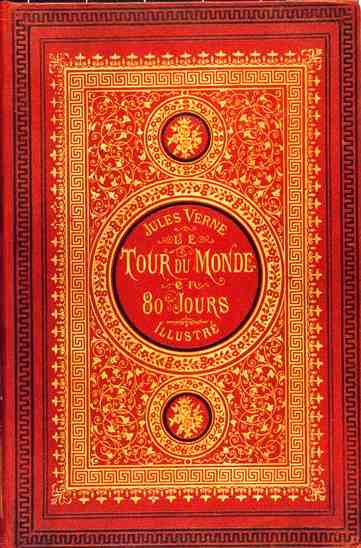
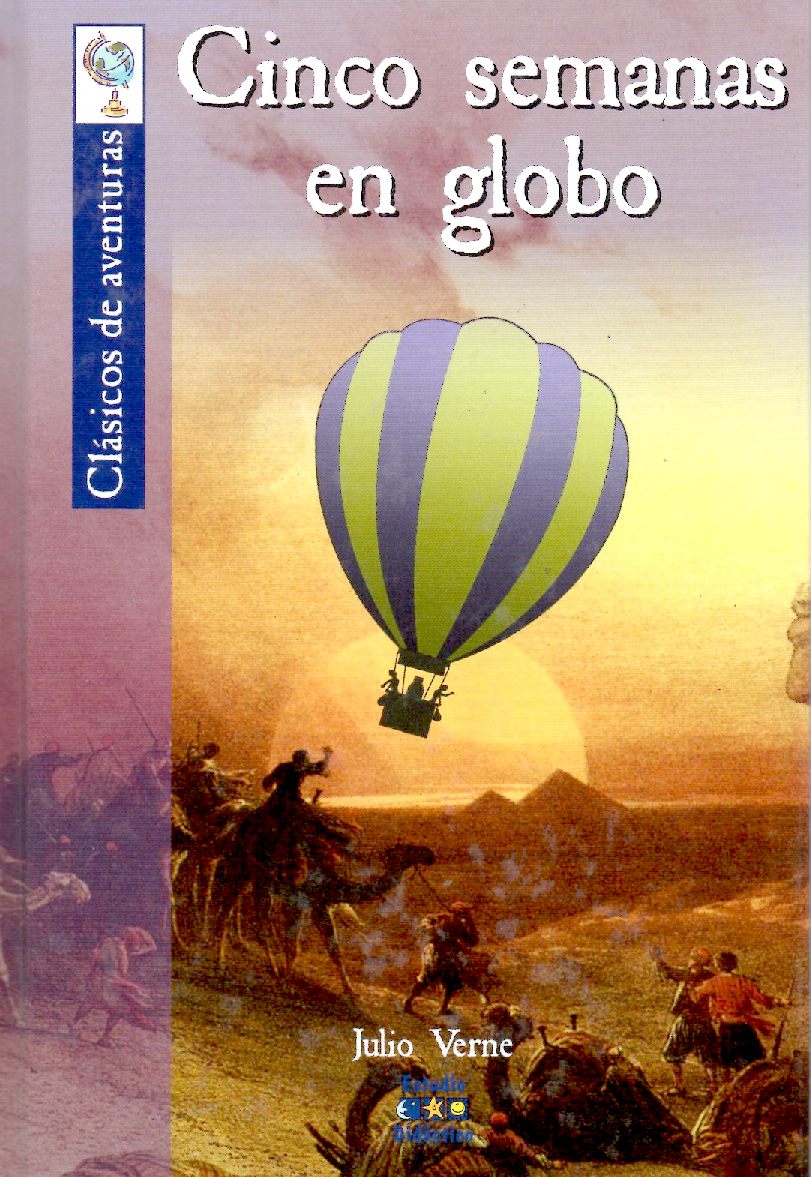
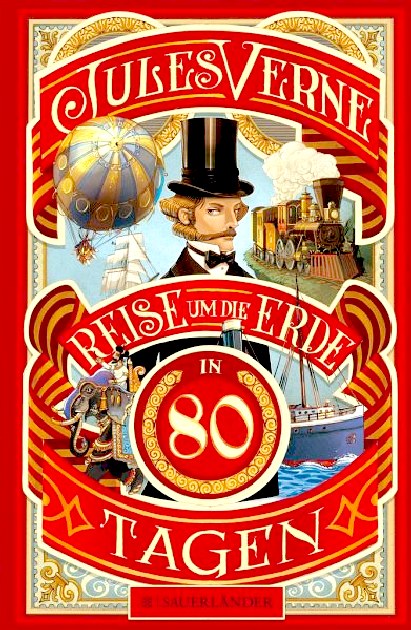
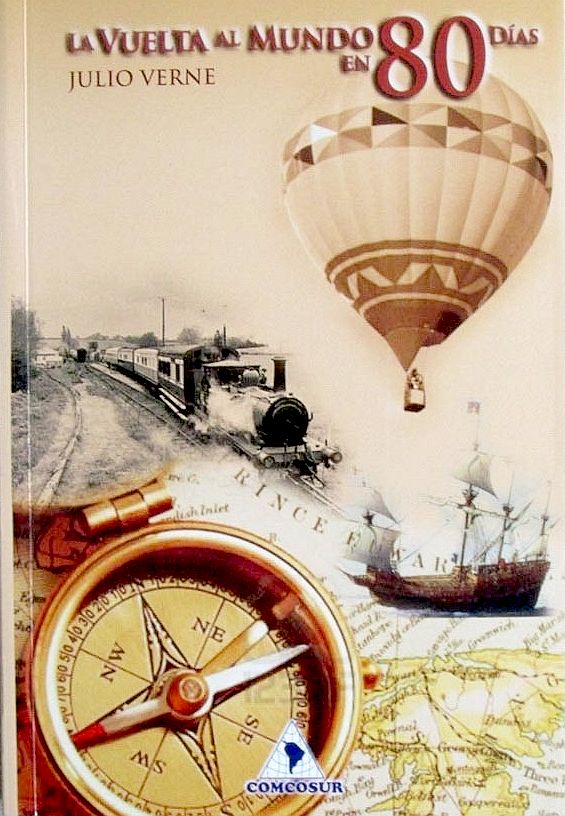
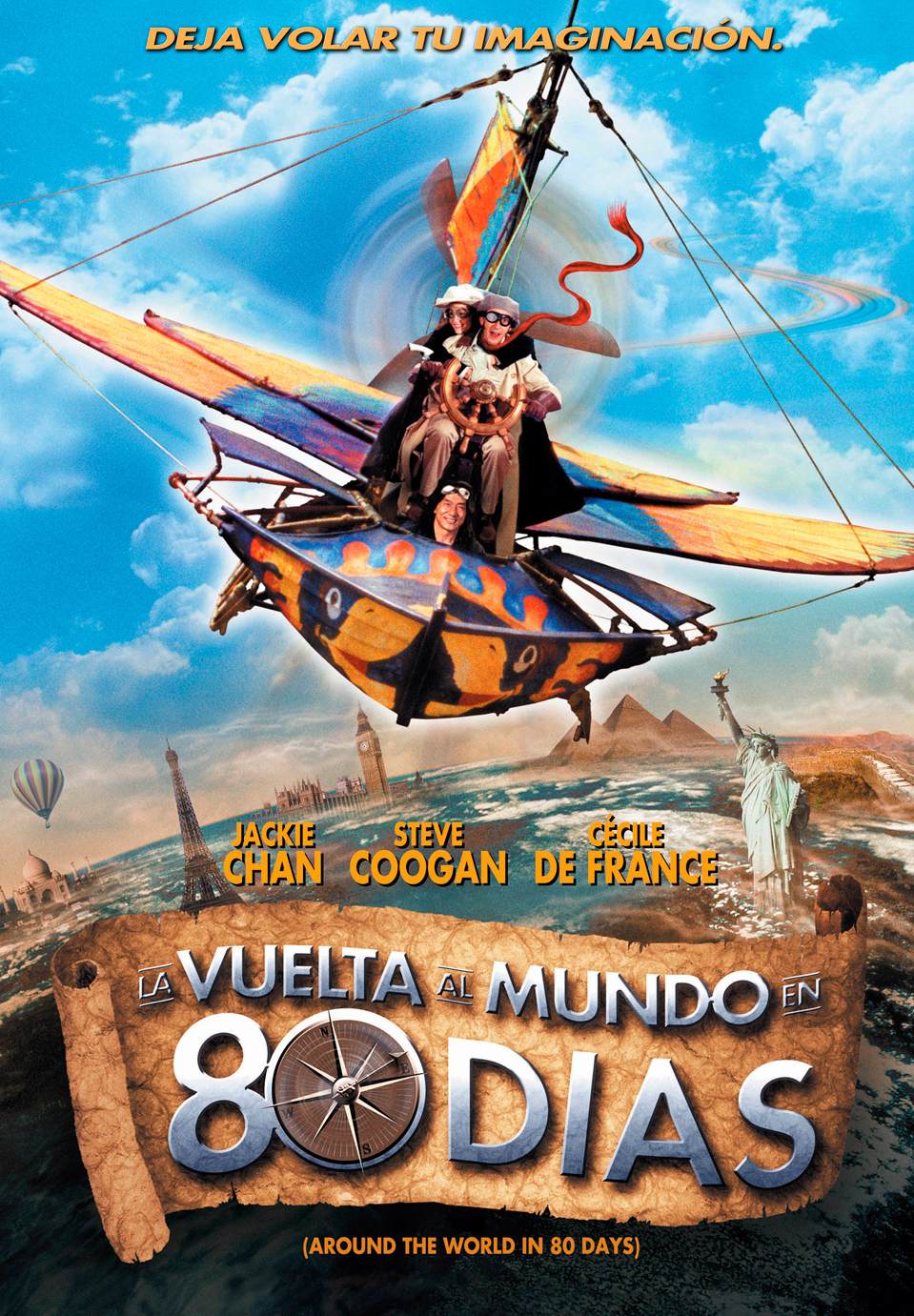
Many
of his stories today seem a little tame, as technology has caught up
with the imagination of the extraordinary French author, and Hollywood
has discovered Computer Generated Images (CGI) allowing super heroes to
grace our screens as never before. Computers are one thing that Verne
did not imagine or seek to portray.
Beginning in late 1872, the serialized version of Verne's famed Around the World in Eighty Days (Le Tour du monde en quatre-vingts jours) first appeared in print. The story of Phileas Fogg and Jean Passepartout takes readers on an adventurous global tour at a time when travel was becoming easier and alluring. In the century plus since its original debut, the work has been adapted for the theater, radio, television and film, including the classic 1956 version starring David
Niven. The TV series starring Pierce Brosnan released in 1989, runs for around 6 hours on
2 DVDs. A BBC
TV travel documentary starring Michael Palin, was also screened in
1989. A second TV series starring David Tennant was produced by the
BBC for 2021.
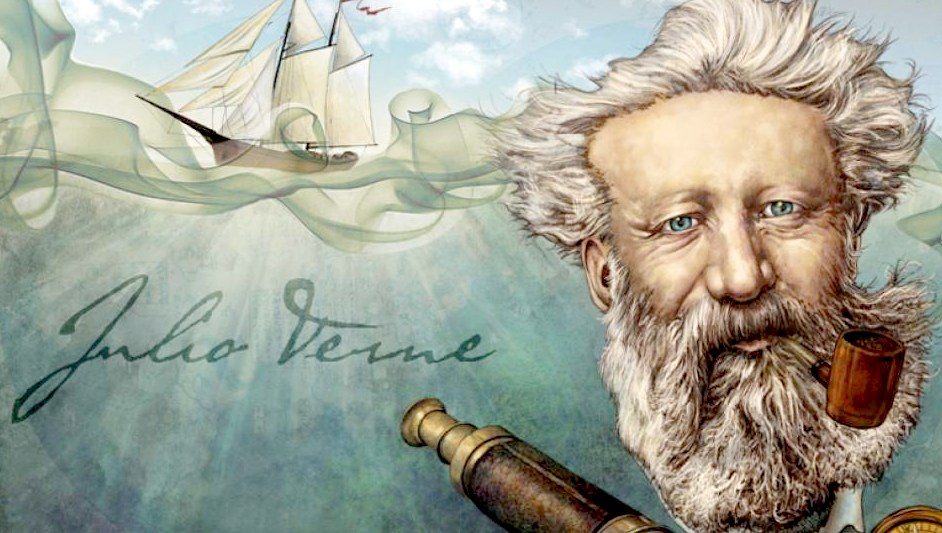
Jules
Verne is known as the Father of Science Fiction
Where
Jules Verne's suggested that it might be possible to travel
Around The
World In 80 Days, we would like to extend that ethos to include
traveling in a Zero
Emission yacht (ZEWT or ZEV) driven by electric
hydro-jets? With the advent of solar power, liquid hydrogen, methanol
reformers, and fuel
cells - we'll wager that it is a distinct possibility - on a scale of the
stake that the legendary Philleas Fogg entered into at the Reform Club in
1872. Now there's a challenge for you. Place your bets!
|







